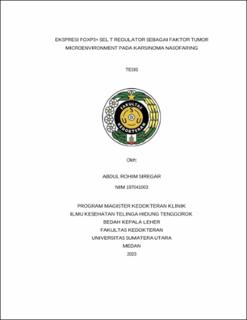Ekspresi FOXP3+ Sel T Regulator sebagai Faktor Tumor Microenvironment pada Karsinoma Nasofaring
The Expression of FOXP3+ Treg Cells in The Tumor Microenvironment of Nasopharyngeal Carcinoma

Date
2023Author
Siregar, Abdul Rohim
Advisor(s)
Farhat
Rambe, Andrina Yunita Murni
Metadata
Show full item recordAbstract
Introduction: Nasopharyngeal carcinoma (KNF) is the most common type of
cancer found in the Rosenmuller's fossa. Currently, the Tumor Microenvironment
(TME) is believed to play an important role in cancer progression. Regulatory T
cells (Tregs) are immune cells that play an important role in the TME and are
characterized by the expression of the Forkhead box P3 transcription factor
(FOXP3+).
Objective: This study aimed to determine the expression of FOXP3+ Treg cells in
the tumor microenvironment of nasopharyngeal carcinoma.
Material and Methods: This is an analytical cross-sectional study using paraffin
blocks from KNF patients examined by RT-PCR to assess FOXP3+ expression.
Results: The study subjects were 31 people, 22 men (71%) and 9 women (29%),
with a mean age of 45.39 years. The mean number of FOXP3+ regulatory T cells
in all subjects in this study was 0.52. There was no significant relationship between
FOXP3+ regulatory T cell expression and histopathological type (p = 0.789), tumor
mass expansion (p = 0.151), or KNF stage (p = 0.054), but there was a statistically
significant relationship with lymph node enlargement (p = 0.021).
Conclusion: This study showed a significant association between increased
expression of FOXP3+ regulatory T cells and KGB enlargement; however, there
was no significant association between histopathological type, tumor extension, and
clinical staging. This study shows that there is a trend towards increased expression
of FOXP3+ regulatory T cells at an early stage. Presumably, regulatory T cells, as
immunosuppressive cells, decrease in the advanced stage owing to the reduced
number of anti-cancer immune cells.
